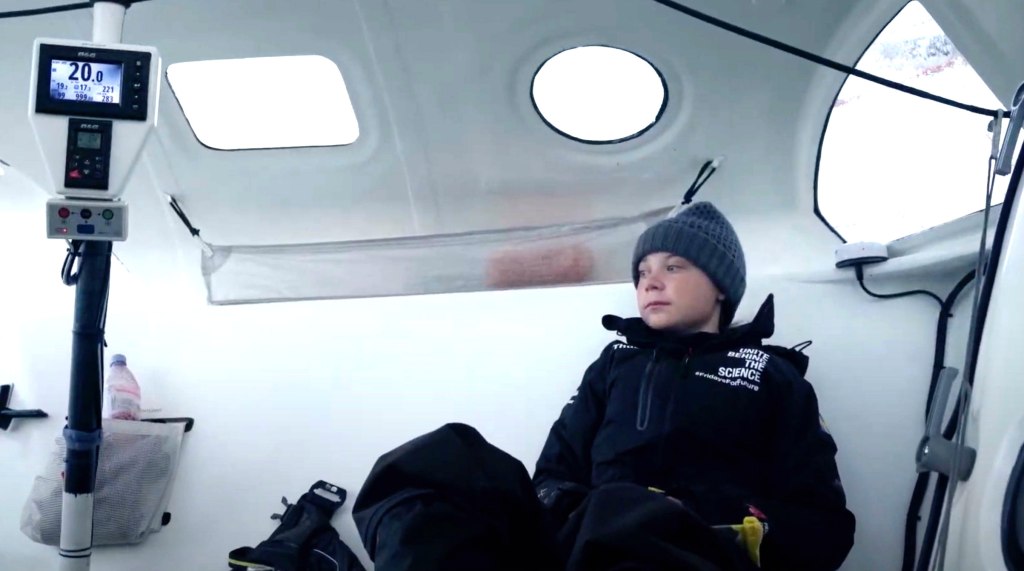Mostly, however, Grossman's film is a conventional recap of a story so far; more than anything, it's an introduction, noting the formation of the world's most famous and photographed frown. We get glimpses of a happy Greta: the high-schooler merrily reciting the table of chemical elements, like any other pupil of her age, the daughter caught horsing around with dad/minder Svante. Away from the lectern, she can be very charming, as sweet as only kids can be: clock her self-deprecating chuckle after she tells President Macron "I'm a nerd", or how she cackles seemingly to the point of vomiting after spying an unflattering pic of her with the Pope. (Grossman missed a trick with his tagline, which should have been "Greta laughs!") Yet we see discontent visibly setting in on election night 2018, when it becomes apparent that the Swedish Greens hadn't made the gains Thunberg was hoping to bring about when she began her school strike. It gets worse in the wider world. At every conference, Thunberg is faced by a wall of indifferent old men, running down the clock by talking about the wrong things, or talking about the right things in the wrong way. Even her fresher-faced admirers seem more concerned with snapping a selfie with this emergent star than they are with overturning the status quo; as postergirls from Sandra Dee to Miley Cyrus have discovered, it can be hard work getting adults to take you seriously. In retrospect, that's what looks so striking about her simmering speech at the UN: it was a manifestation of frustration at the failures of those around her, an adolescent meltdown on just about the grandest stage imaginable. An explosion typically confined behind bedroom doors was suddenly heard around the world; still, if you objected to that, you really won't like what Mother Nature has waiting in store for you.
Perhaps understandably, Grossman maintains a respectful, sympathetic distance from his subject, reluctant to get too far up in the space of someone who has anxieties enough even before the Big Bullies of the Right (whose bluster is sampled and endured in passing) started taking aim at her. That's a limitation, certainly, but what's interesting is how even a basic primer such as this - a documentary conceived and assembled primarily to bring an audience up to speed - keeps brushing up against the weirdness of the world we now find ourselves in. Future historians (if we get that far) will surely raise an eyebrow at the fact that, as a civilisation, we displaced a teenager with Asperger's many thousands of miles from her home environment, and dropped her in the middle of heaving crowds or before jostling banks of photographers, in order to hold the fire to some horribly dragged feet; furthermore, that we were, collectively, so resistant to (life-sustaining) change that we set numerous highly paid, well-connected attack dogs upon her. I Am Greta is no more or less than an engaging watch, all told, but its eyes were open long enough to see how topsy-turvy this planet now is: that, with bratty denialists in positions of power, and overgrown kids enabling them both in the media and at the ballot box (wah, gimme stimulation! Nah, I don't care what it destroys!), it was down to a pipsqueak in leggings to step up and assert some responsibility. Grossman locates some hope amid this madness: inside one year of activism, Thunberg inspires a global army of Teen Vogue subscribers to mobilise and take to the streets in support of her cause, multiplying her concerns and making more noise on the matter than she ever could on her own. Yet his film also knows, as his subject knows, that time is of the essence. Never have I emerged from a film feeling more in step with "Hey Matthew"-era Karel Fialka: what does Greta achieve in her twenties? Will there be a world for her to live in once she reaches thirty?
I Am Greta is now playing in selected cinemas, and available to rent via Prime Video.

No comments:
Post a Comment